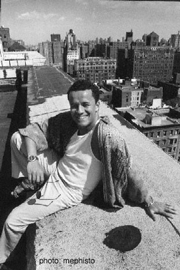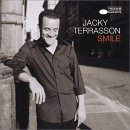

Courtesy of Jacky Terrasson

Blue Note

Blue Note
A FIRESIDE
CHAT WITH JACKY TERRASSON
Since
I am not a fan of piano trios, it gives me great pleasure to say there
are exceptions to the rule among us. Jason Moran and Jacky Terrasson are
two that define the piano book for my generation. Terrasson has drawn
comparisons. Keith Jarrett, I've heard, and he gets McCoy Tyner a good
deal and Bud Powell sometimes, but Terrasson, to me anyway, has a voice
all his own. His rendition of "For Sentimental Reasons" on Reach
(Blue Note), Ravel's "Bolero" from What It Is, and his entire
A Paris… session is proof positive. With a new record soon to be
on store shelves, I sat down with Terrasson and he spoke about his journey,
the new release, and his love of Paris in the springtime (well, anytime),
as always, unedited and in his own words.
FRED
JUNG: Let's start from the beginning.
JACKY
TERRASSON: I would say, to be honest, it was imposed on my when I was
four years old. There was always a piano at home and my parents kind of
said, "OK, you're going to take piano lessons." I really started
liking it around the age of twelve. I didn't really like any particular
style of music back then, I just liked the instrument, the piano. I used
to spend hours at the piano. I was taking classical lessons, but I was
also just messing around, trying to play some blues licks or whatever.
I just liked the instrument. And then I got into records, recordings of
classical and jazz stuff and that's when I was hooked. Back then, a lot
of classical stuff and also Billie Holiday, Thelonious Monk, Nat Cole,
and later Bill Evans, Bud Powell, Miles Davis, Coltrane, my mom had a
lot of jazz records that she brought back from the States and that's what
got me exposed initially to the music.
FJ: Winning the Thelonious Monk Competition (1993), you became an overnight
sensation and the baggage that comes with such distinctions.
JACKY
TERRASSON: Yeah, it was, I think now the whole thing is a little more
structured, not to say that it wasn't at that time, but it was kind of
shocking to me that it really put me in the spotlight for a minute and
suddenly I had to get a lawyer and get a manager and I was courted by
three major labels. It was kind of a whirlwind. I'm not sure of the expression,
but it was a lot of stuff coming at you at once. But never the less, this
being a musician, a professional musician, making a career of the music
is hard enough and things like that help you and you need all the help
you can get so I think it's great. It is media-tized now. It is on national
TV and all that, so it helps the music. It helps jazz.
FJ:
How instrumental was the late Betty Carter on your development?
JACKY
TERRASSON: The first time I met Betty was on a recording session for Javon
Jackson, a saxophone player. It was a Blue Note recording session and
Betty Carter was the producer and I think the session was two days and
by the end of the recording, Betty asked me to join her band and I told
her I needed a week to tell her. (Laughing) No, actually, she only gave
me 48 hours to give her an answer, so I thought about it and I said that
this is what I came to the States for. This is why I left Paris. I went
with it and it was a tremendous learning and musical experience. Betty
really wanted you to play everything you had and to have the piano seat
in that band was really a privilege. She wanted you to push yourself.
She didn't want you to play the same things. She wanted you to really
listen and be attentive, just like she was all the time. I have to say,
she taught me how to just be cool and take my time on the ballads. She
was unique at that, the way she performed ballads. She was a sweetheart.
FJ: Your trio with Ugonna Okegwo and Leon Parker was one of the promising
young trios that realized adult maturity. Are you continuing the evolution?
JACKY
TERRASSON: No, I mean, I've had that trio on and off for ten years. About
three years ago, we made a switch, first changing the bass player. Now
I am playing with Sean Smith at the bass. Recently, about ten months ago,
I've been playing with Eric Harland at the drums. Actually, my latest
recording, Smile, I almost called Trio '02 because to me, a lot of the
music happens in 2002 and also, I consider it my second, really powerful,
exciting trio.
FJ: Did you take Smile prepped into the studio?
JACKY
TERRASSON: Yeah, pretty much. This trio and this recording, Smile, it
is really an extension in a way of my previous recordings, but it is more
of a jazz record. I need to go back to the previous recording, the one
that was called A Paris…, which was basically a collection of French
melodies that I treated like standards, but the record itself had like
fourteen tracks and they are like short tracks. It was more of a conceptual
record and its purpose was to present all these very heavy, beautiful
melodies. When we were on the road, we needed more material and the repertoire
expanded and expanded and we added some stuff that was not related to
the French thing anymore, but somehow connected like "Parisian Thoroughfare,"
Bud Powell and a few French melodies, basically, the extension of the
repertoire, the more the repertoire expanded, that extension is the latest
recording, basically, with the addition of some totally spontaneous stuff
that happened in the studio like "Isn't She Lovely?," like "Nardis,"
were unplanned. So I would say that when I went into the studio, I had
about 60 percent of the material chosen and arranged and then I like to
leave some space for impromptu, unplanned, spontaneous stuff.
FJ: Being born of both cultures and trying to convey one to another becomes
a challenge, a difficulty not aided by the fact that the only French song
most Americans are familiar with is "La Vie en Rose."
JACKY
TERRASSON: Yeah, yeah, "La Vie en Rose," but the idea for that
record was to take, I mean, I grew up with these melodies. I heard them
on TV and on radio. I heard them in the street. I heard them in school.
I heard them in movies. To me, if you look at jazz standards, where do
they come from? They come from old Broadway shows, from movies, from the
street. What I decided to do with A Paris… is the same thing, but
with a repertoire from where I grew up, with French songs. Basically,
the beauty of jazz is you can take any melody and improvise on it and
make it your own, make it something else. Why play the same things? You
can take any melody and play it and have fun with it, disguise it and
have fun with it.
FJ: You make a home of both cultures, you must notice the subtle and not
so subtle nuances.
JACKY
TERRASSON: Wow, that is a heavy question, Fred. I would say, to answer
it globally, quality of life. This has nothing to do with music, well,
maybe it does, but I think the quality of life in Europe in general is
of better quality than here. For social reasons, for all kinds of reasons.
FJ: Certainly the European union supports the arts more.
JACKY
TERRASSON: That's true, well, in general, let's go back to jazz. Jazz
has always been accepted and recognized as an art form. I think it is
now here, well, it is getting there, but it has been recognized and accepted
and respected earlier in time over in Europe than here, which is kind
of surprising since it is probably one of the only genuine, not only,
but really genuine art forms of the United States.
FJ: You did Kindred with label mate Stefon Harris.
JACKY
TERRASSON: I loved working with Stefon. We actually have some gigs lined
up for next year. Yeah, he is a very exciting, unpredictable player and
I like that. There is always an element of surprise and I like to be kind
of have that in my playing myself. When we're playing, it is like a mouse
and a cat having fun (laughing).
FJ: You both are better live than on record.
JACKY
TERRASSON: Well, we're going to hopefully, it looks like there is a nice
tour shaping up in the States for January and February.
FJ: Any dates on calendar?
JACKY
TERRASSON: Well, I will only give you the confirmed dates. So far, we
have a week in New York City at the Village Vanguard. That is going to
be February 4-9. In January, prior to that, sorry, 14, 15, 16, Yoshi's,
Oakland, California. The following week, from the 21-26 at the Jazz Bakery
in LA and then some tentative stuff, but it is not confirmed.
FJ: What do you realize now, you didn't then?
JACKY
TERRASSON: Yeah, the one thing I've learned, I can say, simply with time
is that you should always trust your heart and only that and your gut
feeling and try to not be affected by either the hip, the good stuff,
neither the negative stuff, but always follow and believe in your own
thing. I think that is what makes me get up and practice and compose or
go on the road because there is a lot of defeating stuff out there.
FJ: Lastly, do you love Paris in the springtime?
JACKY
TERRASSON: (Laughing) Yeah, yeah, I like Paris all seasons.
FJ:
It has four.
JACKY
TERRASSON: (Laughing) Yeah, the springtime, the fall. I was just there
ten days ago. It was beautiful. Paris is my home town.
FJ: I live in Southern California. We have a variation of one season.
JACKY
TERRASSON: (Laughing) Well, we're going to be there soon. Actually, I
will be glad to be there because it will be warmer than New York.
Fred Jung is the Editor-In-Chief and here is to the twins. Comments? Email
Him